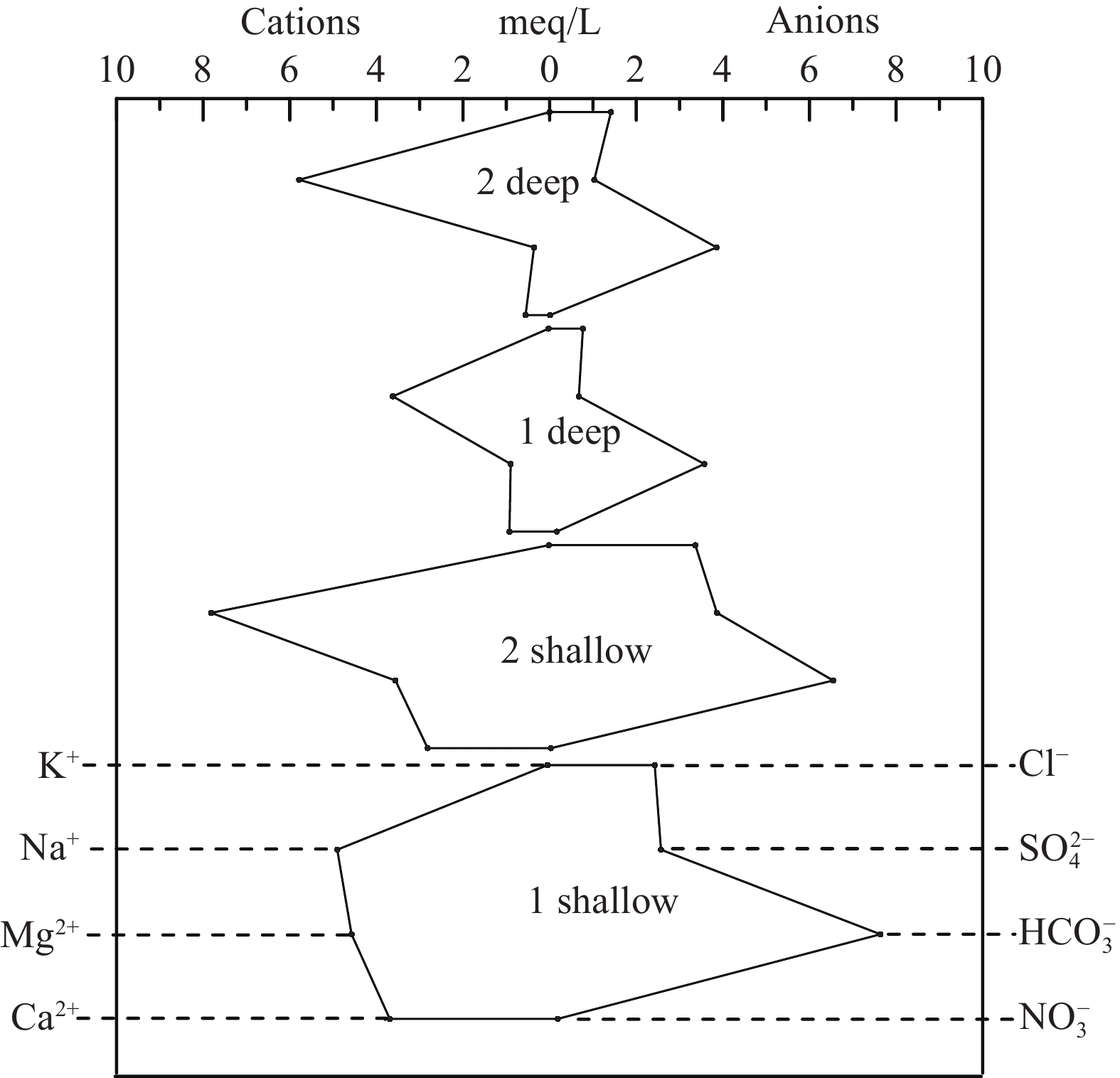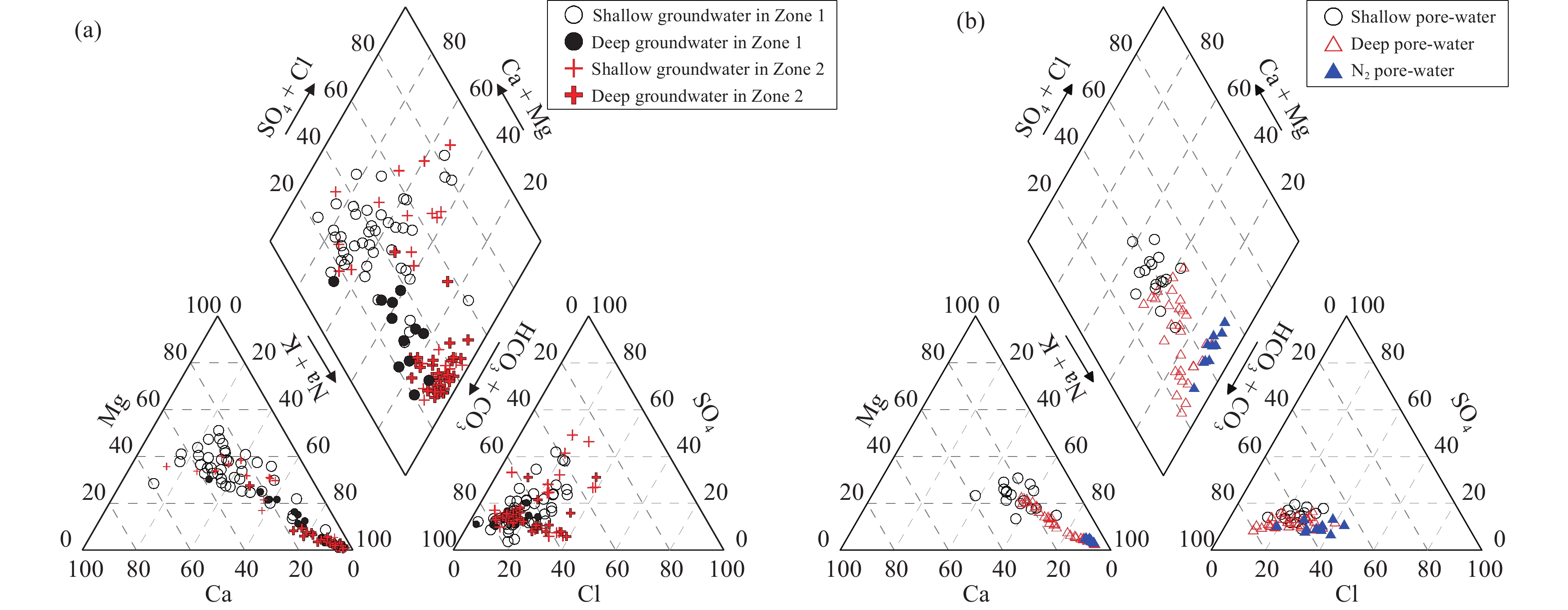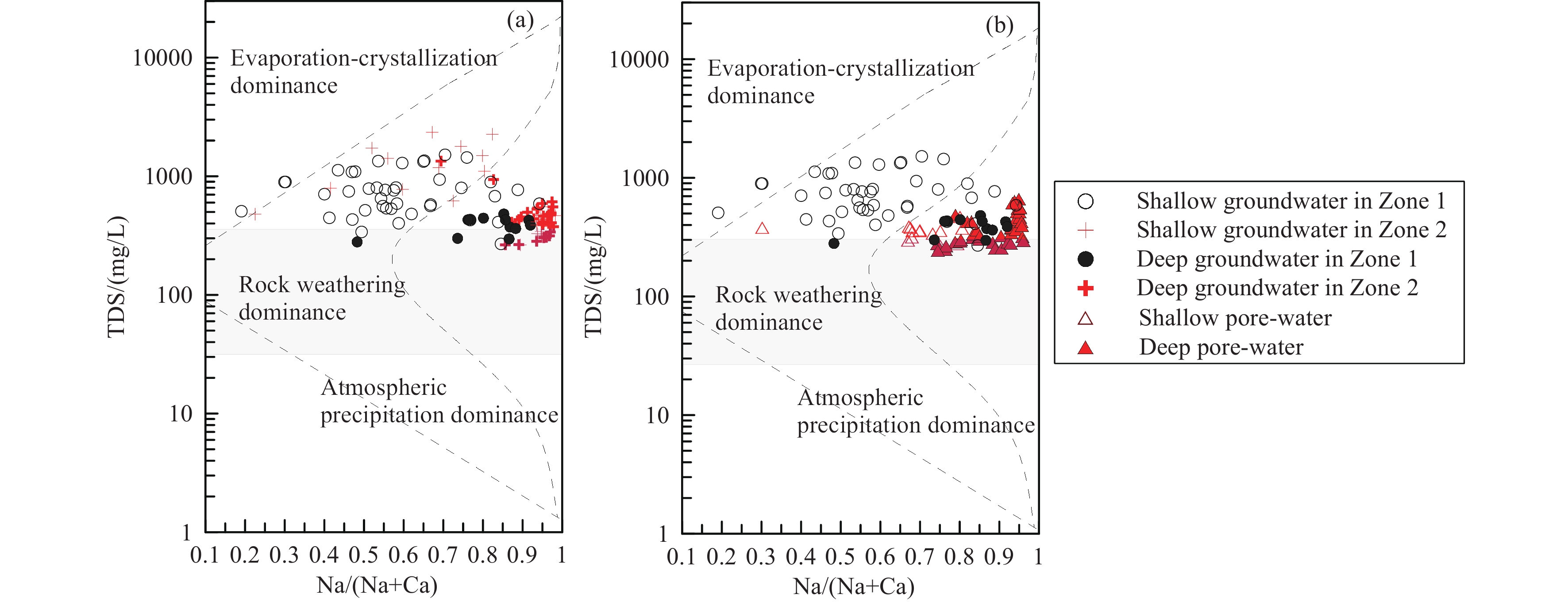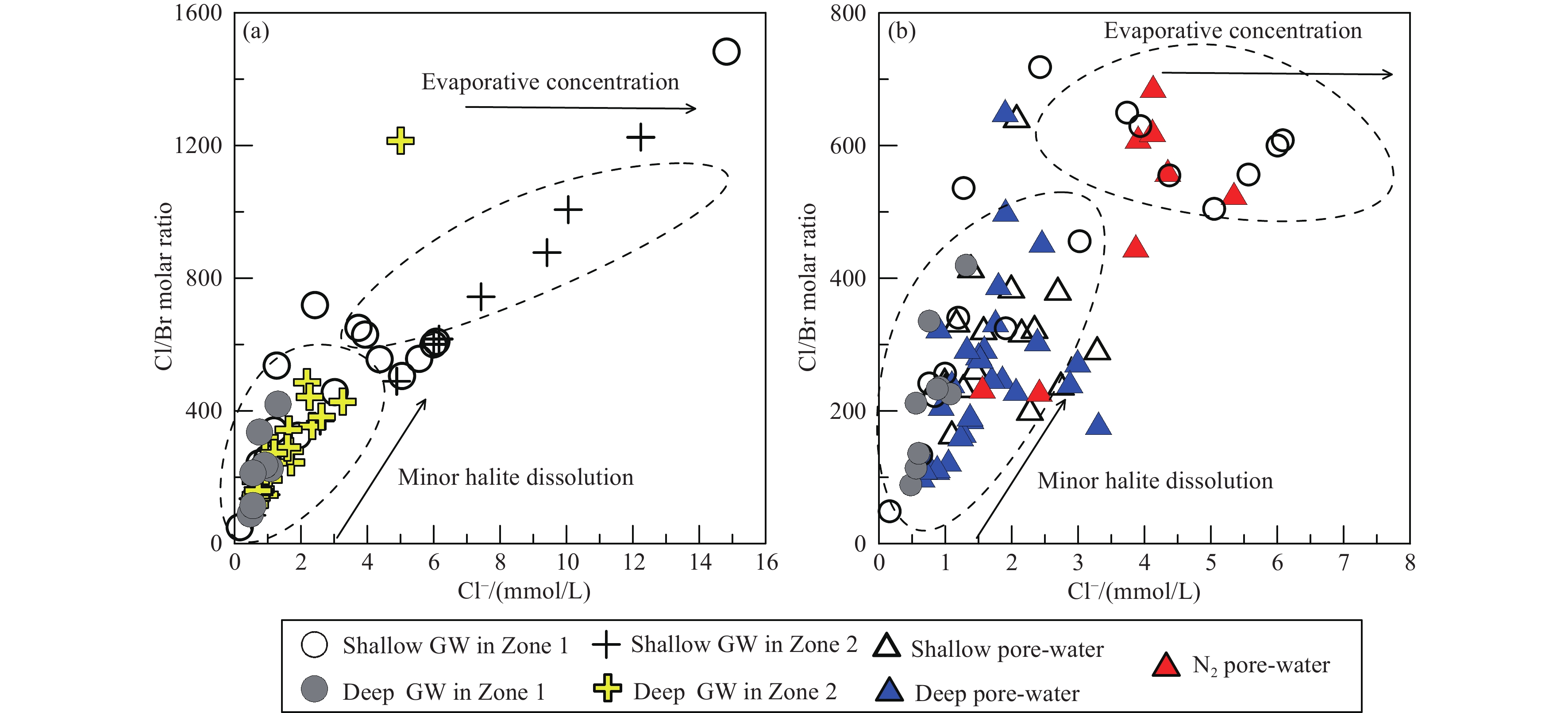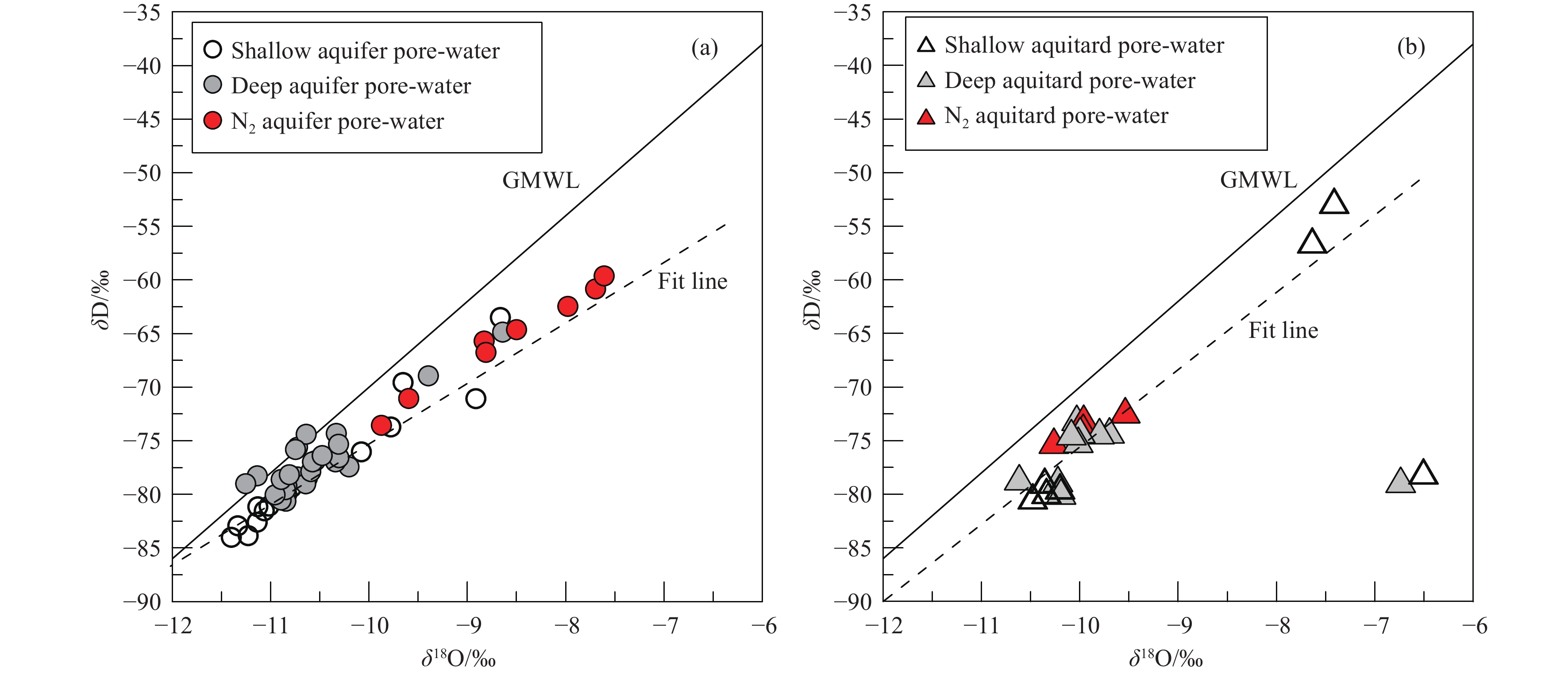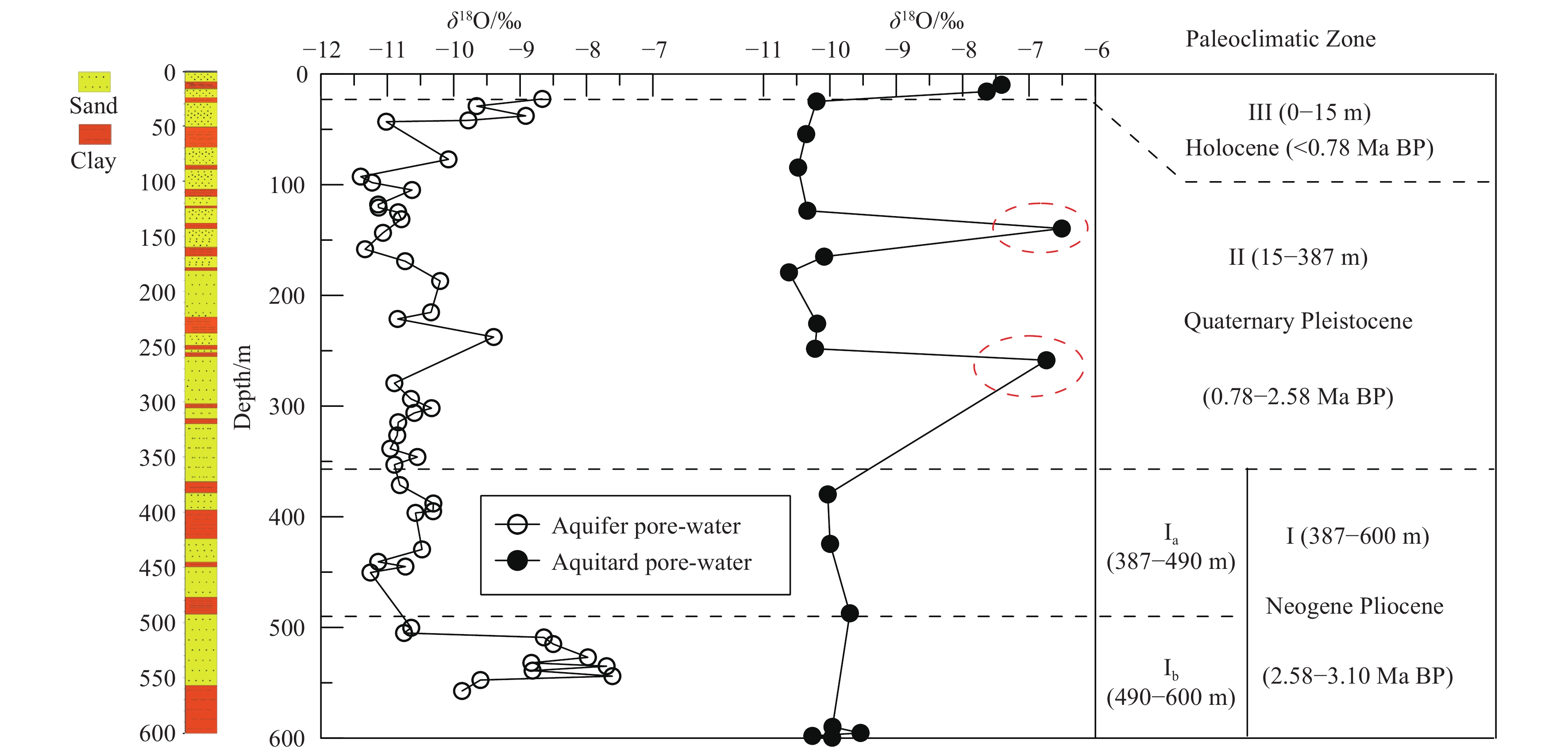| Citation: | Kai Zhao, Jing-xian Qi, Yi Chen, Bai-heng Ma, Li Yi, Hua-ming Guo, Xin-zhou Wang, Lin-ying Wang, Hai-tao Li, 2021. Hydrogeochemical characteristics of groundwater and pore-water and the paleoenvironmental evolution in the past 3.10 Ma in the Xiong’an New Area, North China, China Geology, 4, 476-486. doi: 10.31035/cg2021058 |
Hydrogeochemical characteristics of groundwater and pore-water and the paleoenvironmental evolution in the past 3.10 Ma in the Xiong’an New Area, North China
-
Abstract
The groundwater level has been continuously decreasing due to climate change and long-time overexploitation in the Xiong ’an New Area, North China, which caused the enhanced mixing of groundwater in different aquifers and significant changes in regional groundwater chemistry characteristics. In this study, groundwater and sediment pore-water in drilling cores obtained from a 600 m borehole were investigated to evaluate hydrogeochemical processes in shallow and deep aquifers and paleo-environmental evolution in the past ca. 3.10 Ma. Results showed that there was no obvious change overall in chemical composition along the direction of groundwater runoff, but different hydrochemical processes occurred in shallow and deep groundwater in the vertical direction. Shallow groundwater (< 150 m) in the Xiong ’an New Area was characterized by high salinity (TDS > 1000 mg/L) and high concentrations of Mn and Fe, while deep groundwater had better water quality with lower salinity. The high TDS values mostly occurred in aquifers with depth < 70 m and >500 m below land surface. Water isotopes showed that aquifer pore-water mostly originated from meteoric water under the influence of evaporation, and aquitard pore-water belonged to Paleo meteoric water. In addition, the evolution of the paleoclimate since 3.10 Ma BP was reconstructed, and four climate periods were determined by the δ18O profiles of pore-water and sporopollen records from sediments at different depths. It can be inferred that the Quaternary Pleistocene (0.78‒2.58 Ma BP) was dominated by the cold and dry climate of the glacial period, with three interglacial intervals of warm and humid climate. What’s more, this study demonstrates the possibilities of the applications of pore-water on the hydrogeochemical study and further supports the finding that pore-water could retain the feature of paleo-sedimentary water.
-

-
References
Bensenouci F, Michelot JL, Matray JM, Savoye S, Massault M, Vinsot A. 2014. Coupled study of water-stable isotopes and anions in porewater for characterizing aqueous transport through the Mesozoic sedimentary series in the eastern Paris Basin. Marine and Petroleum Geology, 53, 88–101. doi: 10.1016/j.marpetgeo.2013.12.012. Bufflap SE, Allen HE. 1995. Sediment pore water collection methods for trace metal analysis: A review. Water Research, 29(1), 165–177. doi: 10.1016/0043-1354(94)E0105-F. Cao C, Lei HY. 2012. Geochemical characteristics of pore water in shallow sediments from north continental slope of South China Sea and their significance for natural gas hydrate occurrence. Procedia Environmental Sciences, 12(PartB), 1017–1023. doi: 10.1016/j.proenv.2012.01.381. Cartwright I, Weaver T, Fifield L. 2006. Cl/Br ratios and environmental isotopes as indicators of recharge variability and groundwater flow: An example from the southeast Murray Basin, Australia. Chemical Geology, 231(1−2), 38–56. doi: 10.1016/j.chemgeo.2005.12.009. Chapman PM, Wang FY, Germano JD, Batley G. 2002. Pore water testing and analysis: The good, the bad, and the ugly. Marine Pollution Bulletin, 44(5), 359–366. doi: 10.1016/S0025-326X(01)00243-0. Chen LZ, Ma T, Du Y, Yang J, Liu L, Shan HM, Liu CF, Cai HS. 2014. Origin and evolution of formation water in North China Plain based on hydrochemistry and stable isotopes (2H, 18O, 37Cl and 81Br). Journal of Geochemical Exploration. 145, 250–259. doi: 10.1016/j.gexplo.2014.07.006. Chen W. 1999. Groundwater in Hebei Province. Beijing, Seismological Press, 41–55 (in Chinese). Chen ZY, Qi JX, Xu JM, Xu JM, Ye H, NanYJ. 2003. Paleoclimatic interpretation of the past 30 ka from isotopic studies of the deep confined aquifer of the North China plain. Applied Geochemistry, 18(7), 997–1009. doi: 10.1016/S0883-2927(02)00206-8. Deng YM, Wang YX, Ma T. 2009. Isotope and minor element geochemistry of high arsenic groundwater from Hangjinhouqi, the Hetao Plain, Inner Mongolia. Applied Geochemistry, 24(4), 587–599. doi: 10.1016/j.apgeochem.2008.12.018. Gibbs RJ. 1970. Mechanisms controlling world water chemistry. Science, 170(3962), 1088–1090. doi: 10.1126/science.170.3962.1088. Guo HM, Chen Y, Hu HY, Zhao K, Li HT, Yan S, Xiu W, Coyte RM, Vengosh A. 2020. High hexavalent chromium concentration in groundwater from a deep aquifer in the Baiyangdian Basin of the North China Plain. Environmental Science and Technology, 54(16), 10068–10077. doi: 10.1021/acs.est.0c02357. Guo W, Zhang HY, Huo SL. 2014. Organochlorine pesticides in aquatic hydrophyte tissues and surrounding sediments in Baiyangdian wetland, China. Ecological Engineering, 67, 150–155. doi: 10.1016/j.ecoleng.2014.03.047. Han DM, Cao GL, Currell MJ, Priestley SC, Love AJ. 2020. Groundwater salinization and flushing during glacial-interglacial cycles: Insights from aquitard porewater tracer profiles in the North China Plain. Water Resources Research, 56(11). doi: 10.1029/2020WR027879. Harrington GA, Gardner WP, Smerdon BD, Hendry MJ. 2013. Palaeohydrogeological insights from natural tracer profiles in aquitard porewater, Great Artesian Basin, Australia. Water Resources Research, 49(7), 4054–4070. doi: 10.1002/wrcr.20327. Hendry MJ, Harrington GA. 2014. Comparing vertical profiles of natural tracers in the Williston Basin to estimate the onset of deep aquifer activation. Water Resources Research, 50(8), 6496–6506. doi: 10.1002/2014WR015652. Hendry MJ, Wassenaar LI. 1999. Implications of the distribution of δD in pore waters for groundwater flow and the timing of geologic events in a thick aquitard system. Water Resources Research, 35(6), 1751–1760. doi: 10.1029/1999WR900046. Hendry MJ, Woodbury AD. 2007. Clay aquitards as archives of Holocene paleoclimate: δ18O and thermal profiling. Groundwater, 45(6), 683–691. doi: 10.1111/j.1745-6584.2007.00354.x. Hesse R. 2003. Pore water anomalies of submarine gas-hydrate zones as tool to assess hydrate abundance and distribution in the subsurface: What have we learned in the past decade? Earth-Science Reviews, 61(1), 149–179. doi: 10.1016/S0012-8252(02)00117-4. Li HT, Feng W, Wang KL, Zhao K, Li G, Zhang Y, Li MZ, Sun L, Chen YC, You B. 2021. Groundwater resources in Xiong’an New Area and its exploitation potential. Geology in China, 48(4), 1112–1126 (in Chinese with English abstract). doi: 10.12029/gc20210409. Li J, Liang X, Jin MG, Xiao GQ, He JS, Pei YD. 2014. Geochemistry of clayey aquitard pore water as archive of paleo-environment, Western Bohai Bay. Journal of Earth Science, 26(3), 445–452. doi: 10.1007/s12583-014-0491-x. Li J, Liang X, Zhang YN, Liu Y, Chen NJ, Abubakari A, Jin MG. 2017. Salinization of porewater in a multiple aquitard-aquifer system in Jiangsu coastal plain, China. Hydrogeology Journal, 25(8), 2377–2390. doi: 10.1007/s10040-017-1622-0. Li X, Cui BS, Yang QC, Lan Y. 2016. Impacts of water level fluctuations on detritus accumulation in Lake Baiyangdian, China. Ecohydrology, 9(1), 52–67. doi: 10.1002/eco.1610. Liu HY, Guo HM, Xing LN, ZhanYH, Li FL, Shao JL, Niu H, Liang X, Li CQ. 2016. Geochemical behaviors of rare earth elements in groundwater along a flow path in the North China Plain. Journal of Asian Earth Sciences, 117, 33–51. doi: 10.1016/j.jseaes.2015.11.021. Liu HY, Guo HM, Yang LJ, Wu LH, Li FL, Li SY, Ni P, Liang X. 2015. Occurrence and formation of high fluoride groundwater in the Hengshui area of the North China Plain. Environmental Earth Sciences, 74(3), 2329–2340. doi: 10.1007/s12665-015-4225-x. Ma Z, Xia YB, Li HT, Han B, Yu XZ, Zhou YL, Wang YS, Guo X, Li HQ, Pei YD. 2021. Analysis of natural resources and environment eco-geological conditions in the Xiong’an New Area. Geology in China, 48(3), 677–696 (in Chinese with English abstract). doi: 10.12029/gc20210301. Niu H, Liang X, Lu GP, Peng F, Jin MG, Gu YS. 2017. A study of clay pore water and sporopollens for characterizing paleoenvironments in the Hebei Plain, Northern China. Journal of Asian Earth Sciences, 143, 1–10. doi: 10.1016/j.jseaes.2017.03.035. Ortega-Guerrero A. 2003. Origin and geochemical evolution of groundwater in a closed-basin clayey aquitard, Northern Mexico. Journal of Hydrology, 284(1−4), 26–44. doi: 10.1016/S0022-1694(03)00239-7. Pang ZH, Kong YL, Li J, Tian J. 2017. An isotopic geoindicator in the hydrological cycle. Procedia Earth and Planetary Science, 17, 534–537. doi: 10.1016/j.proeps.2016.12.135. Qaisar M, Muhammad A, Muhammad R, Shanawar H, Waqas M, Muhammad AM, Muhammad I, Lubna A. 2020. Integration of geoelectric and hydrochemical approaches for delineation of groundwater potential zones in alluvial aquifer. Journal of Groundwater Science and Engineering, 8(4), 366–380. doi: 10.19637/j.cnki.2305-7068.2020.04.007. Sacchi E, Michelot JL, Pitsch H, Lalieux P, Aranyossy JF. 2001. Extraction of water and solutes from argillaceous rocks for geochemical characterisation: Methods, processes, and current understanding. Hydrogeology Journal, 9(1), 17–33. doi: 10.1007/s100400000113. Sadiq R, Husain T, Bose N, Veitch B. 2003. Distribution of heavy metals in sediment pore water due to offshore discharges: An ecological risk assessment. Environmental Modelling and Software, 18(5), 451–461. doi: 10.1016/S1364-8152(03)00010-0. Shao JL, Li L, Cui YL, Zhang ZJ. 2013. Groundwater flow simulation and its application in groundwater resource evaluation in the North China Plain, China. Acta Geologica Sinica (English Edition), 87(1), 243–253. doi: 10.1111/1755-6724.12045. Shi JS, Li GM, Liang X, Chen ZY, Shao JL, Song XF. 2014. Evolution mechanism and control of groundwater in the North China Plain. Acta Geoscientica Sinica, 35(5), 527–534 (in Chinese with English abstract). doi: 10.3975/cagsb.2014.05.01. Song CQ, Ke LH, Pan H, Zhan SG, Liu K, Ma RH. 2018. Long-term surface water changes and driving cause in Xiong’an, China: From dense Landsat time series images and synthetic analysis. Science Bulletin, 63(11), 708–716. doi: 10.1016/j.scib.2018.05.002. Sun YB, Wu SG, Dong DD, Lüdmann T, Gong YH. 2012. Gas hydrates associated with gas chimneys in fine-grained sediments of the northern South China Sea. Marine Geology, 311, 32–40. doi: 10.1016/j.margeo.2012.04.003. Taheri M, Gharaie MHM, Mehrzad J, Afshari R, Datta S. 2017. Hydrogeochemical and isotopic evaluation of arsenic contaminated waters in an argillic alteration zone. Journal of Geochemical Exploration, 175, 1–10. doi: 10.1016/j.gexplo.2016.12.005. Valle J, Gonsior M, Harir M, Enrich-Prast A, Schmitt-Kopplin P, Bastviken D, Conrad R, Hertkorn N. 2018. Extensive processing of sediment pore water dissolved organic matter during anoxic incubation as observed by high-field mass spectrometry (FTICR-MS). Water Research, 129, 252–263. doi: 10.1016/j.watres.2017.11.015. Wang SQ, Song XF, Wang QX, Xiao GQ, Liu CM, Liu JR. 2009. Shallow groundwater dynamics in North China Plain. Journal of Geographical Sciences, 19(2), 175–188. doi: 10.1007/s11442-009-0175-0. Xing LN, Guo HM, Zhan YH. 2013. Groundwater hydrochemical characteristics and processes along flow paths in the North China Plain. Journal of Asian Earth Sciences, 70–71, 250−264. doi: 10.1016/j.jseaes.2013.03.017. Zhang YQ, Wang GW, Wang SQ, Yuan RQ, Tang CY, Song XF. 2018. Hydrochemical characteristics and geochemistry evolution of groundwater in the plain area of the Lake Baiyangdian watershed, North China. Journal of Groundwater Science and Engineering, 6(3), 220–233. doi: 10.19637/j.cnki.2305-7068.2018.03.007. Zhang Z, Guo HM, Wang Z. 2018. Differences in major ions as well as hydrogen and oxygen isotopes of sediment pore water and lake water. Water Science and Engineering, 11(2), 147–156. doi: 10.1016/j.wse.2018.07.005. Zhang ZH, Shi DH, Ren FH, Yin ZZ, Sun JC, Zhang CY. 1997. Evolution of Quaternary groundwater system in North China Plain. Science in China Series D: Earth Sciences, 40(3), 276–283. doi: 10.1007/BF02877536. Zhu H, Yan BX, Pan XF, Yang YH, Wang LX. 2011. Geochemical characteristics of heavy metals in riparian sediment pore water of Songhua River, Northeast China. Chinese Geographical Science, 21(2), 195–203. doi: 10.1007/s11769-011-0448-2. Zhu MJ, Wang SQ, Kong XL, Zheng WB, Feng WZ, Zhang XF, Yuan RQ, Song XF, Sprenger M. 2019. Interaction of surface water and groundwater influenced by groundwater over-extraction, waste water discharge and water transfer in Xiong’an New Area, China. Water, 11(3), 539. doi: 10.3390/w11030539. -
Access History

-
Figure 1.
Sampling locations and the borehole used to sample pore-water in the Xiong’an New Area, North China.
-
Figure 2.
Stiff plots of groundwater in the Xiong’an New Area, North China. 1 shallow‒shallow groundwater in Zone 1; 2 shallow‒shallow groundwater in Zone 2; 1 deep‒deep groundwater in Zone 1; 2 deep‒deep groundwater in Zone 2.
-
Figure 3.
Box-whisker plots of major ions in shallow and deep groundwater in Zone 1 and depth-dependent concentrations of major components of pore-water in the Xiong’an New Area, North China.
-
Figure 4.
Piper plots of groundwater (a) and pore-water (b) in the Xiong’an New Area, North China.
-
Figure 5.
Gibbs plots of groundwater (a) and pore-water (b) in the Xiong’an New Area, North China.
-
Figure 6.
Variations in Cl/Br ratios with Cl concentration of groundwater (a) and pore-water (b) in the Xiong’an New Area, North China.
-
Figure 7.
Stable isotopic composition of aquifer pore-water (a) and aquitard pore-water (b) in the Xiong’an New Area, North China. The solid line marks the global meteoric water line (GMWL).
-
Figure 8.
The δ18O profiles of pore-water and paleoclimate significance in the Xiong’an New Area, North China.

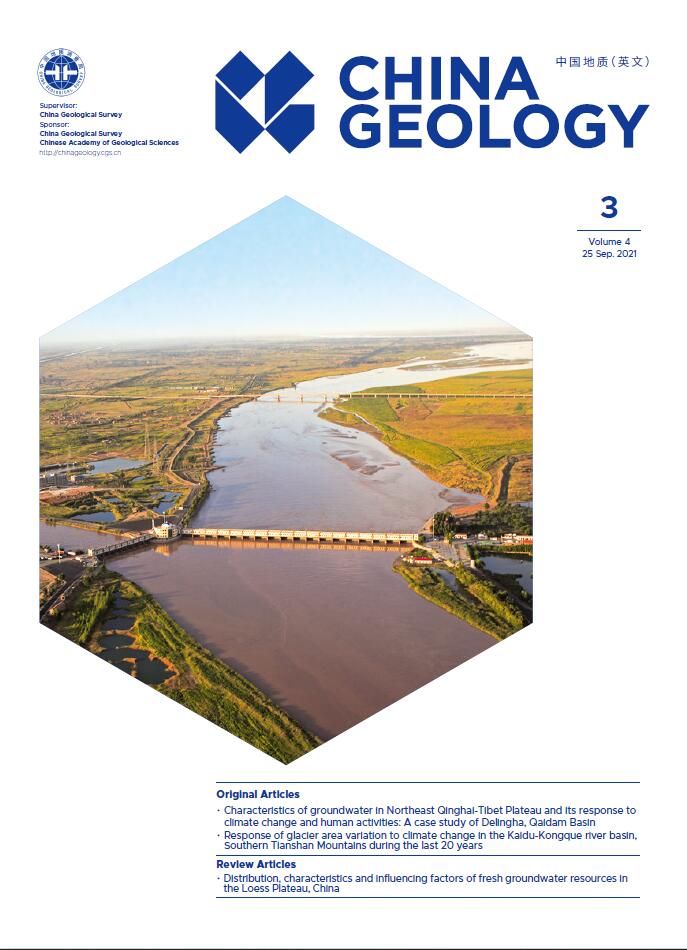

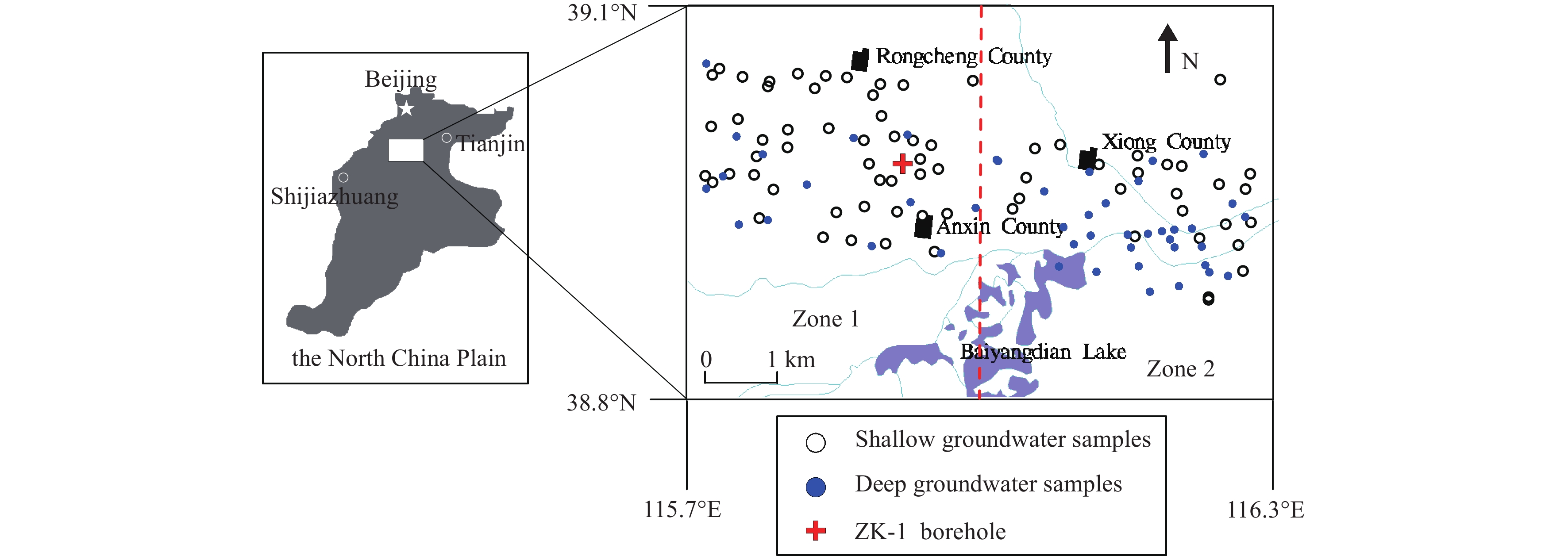

 DownLoad:
DownLoad:
